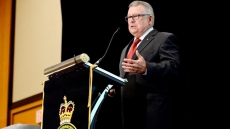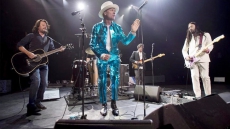On the last leg of his 3,200-kilometre voyage down the Yukon River on a riverboard, Denis Morin was moved to tears.
He had stopped for a day to rest in Mountain Village, Alaska, a reservation of less than 1,000 people. He connected with the people there, he said, and when he left, a group of villagers bid him farewell on the beach.
The Quebec man said traditionally, that's something they do for loved ones who are leaving by boat.
"I saw a group of people coming to the beach, just to see me," he said. "I'll bring that with me for a long time."
Morin, 54, wasn't leaving by boat. By that point, he'd travelled thousands of kilometres over several weeks by riverboard — something like a paddle board with raised edges.
Riverboarding is a whitewater sport, Morin said. Riverboarders wear helmets and flippers, and when the river flow isn't strong enough to carry them, they swim. He was on the trek for 75 days — including 10 days of rest — from late May to early August.
He'd usually be in the water six hours a day, Morin said. Although sometimes when it was stormy, he'd cut his day short and set up camp.
Early on in his trip, when he got to Whitehorse Lake, it was snowing and hailing, he said.

"In my mind, I thought, 'What kind of adventure am I getting myself into?' " he said. But he kept going.
The longest he spent in the water was 11 hours, when he reached the Arctic Circle, Morin said. It was summer, so the sun shone for most of the day.
"It was a wonderful day," he said.
This wasn't Morin's first long-haul trip — he'd riverboarded in northern Quebec before. But this trip was different. It was his first trip after retiring from a career in information technology, and he said he figured it would be a good transition to his "new lifestyle".
And his new lifestyle doesn't include much stuff — he sold everything he owned, and all he brought with him on the trip were two inflatable bags that floated behind him in the river.
They contained camping materials, like a tent, some clothes, a first aid kit and three months worth of food — mostly dehydrated "astronaut" food.
But he said he would sometimes stop in villages adjacent to the river to pick up "comfort food" like cookies.
"I'm kind of a cookie monster," he said. "And I couldn't bring cookies for three months."



